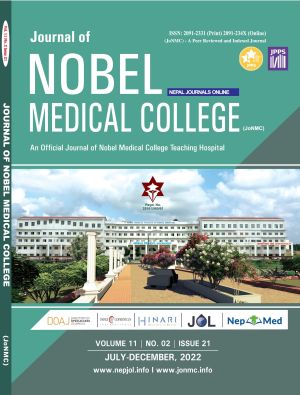Sepsis Screen Parameters in Blood Culture Positive Neonatal Sepsis
DOI:
https://doi.org/10.3126/jonmc.v11i2.50454Keywords:
Blood culture, Neonate, SepsisAbstract
Background: Neonatal sepsis is a clinical syndrome of bacteremia characterized by systemic signs and symptoms of infection in the first 28 days of life. Although, Positive blood culture is the gold standard for the diagnosis of neonatal septicemia, definitive culture results take at least 48–72 h, resulting in treatment delay. Hence certain rapid diagnostic tests such as C-reactive protein, micro erythrocyte sedimentation rate, total white blood cell count, absolute neutrophil count, and immature/total neutrophil count ratio collectively termed as the “Sepsis Screen” is used. The aim of this research is to study the relation between sepsis screen parameters and blood culture proven neonatal sepsis and to assess the clinical profile of neonates with culture-proven sepsis.
Materials and Methods: This was a descriptive observational study conducted on 97 clinically suspected neonatal sepsis cases in the neonatal intensive care unit.. Sepsis screen tests were evaluated for sensitivity, specificity, positive predictive value and negative predictive value. The culture results were correlated with sepsis screen tests and p-value<0.05 was considered significant.
Results: Early-onset sepsis was seen in 47.4% cases, while late-onset sepsis accounted for 52.6% cases. Immature to total neutrophil ratio was the single best reliable sepsis screen test with a high specificity, PPV, and negative predictive values of 93.8%, 85.7%, and 88.4% respectively.
Conclusion: Most of the individual sepsis screen parameters showed statistical correlation with blood culture status, yet Immature to total neutrophil ratio had highest sensitivity, specificity, positive predictive value and proved to be a sensitive and responsive indicator of neonatal sepsis.
Downloads
Downloads
Published
How to Cite
Issue
Section
License

This work is licensed under a Creative Commons Attribution 4.0 International License.
JoNMC applies the Creative Commons Attribution (CC BY) license to works we publish. Under this license, authors retain ownership of the copyright for their content, but they allow anyone to download, reuse, reprint, modify, distribute and/or copy the content as long as the original authors and source are cited.




